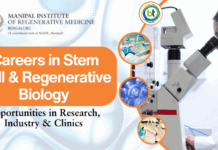Future of Genetic Counselling: Trends, Opportunities, and Career Paths
Genetic counselling is a rapidly evolving field that plays a crucial role in helping individuals and families understand and navigate the complex world of genetics. With advancements in technology, expanding knowledge of genomics, and the integration of genetic information into healthcare, the future of genetic counselling holds immense promise. This article explores the current trends and advancements shaping the field, the demand for professionals in genetic counselling, specialized areas of growth, potential career paths, and the key skills and qualifications sought by employers. By delving into these aspects, we aim to shed light on the exciting opportunities and possibilities that lie ahead for genetic counselling.
Current trends and advancements in genetic counselling that are shaping its future include:
- Expanding genetic testing options: The field of genetic testing is rapidly advancing, with the development of new technologies such as next-generation sequencing, whole exome sequencing, and whole genome sequencing. These advancements are allowing genetic counsellors to provide more comprehensive and accurate information about genetic conditions and potential risks to individuals and families.
- Integration of genomic information into healthcare: Genomic information is increasingly being used in clinical practice to inform treatment decisions, personalized medicine, and disease prevention. Genetic counsellors play a vital role in interpreting and explaining genomic data to healthcare providers and patients, facilitating the integration of genetic information into routine healthcare.
- Precision medicine: Genetic counsellors are becoming key players in the implementation of precision medicine, which involves tailoring medical treatments to an individual’s unique genetic profile. By analyzing genetic data, genetic counsellors can help guide treatment decisions, identify potential adverse drug reactions, and assess disease risks.
- Telemedicine and remote genetic counselling: With the advancement of telemedicine technologies, genetic counselling services can now be provided remotely, allowing access to individuals in underserved areas or those who have difficulty travelling. Remote genetic counselling has the potential to increase access to care, especially for rural populations, and improve efficiency in service delivery.
The demand for professionals in genetic counselling is expected to evolve in the coming years due to several factors:
- Increasing awareness and utilization of genetic services: As genetic testing becomes more common and affordable, individuals and healthcare providers are increasingly recognizing the value of genetic counselling in understanding test results, making informed decisions, and managing genetic conditions. This growing awareness is likely to drive increased demand for genetic counselling services.
- Advancements in genomics research and technology: Ongoing research and technological advancements will continue to uncover new genetic associations with diseases and therapeutic targets. This expanding knowledge base will require more genetic counsellors to help individuals understand and navigate the complex information related to their genetic risks, treatment options, and implications for family planning.
- Integrating genetics into mainstream healthcare: As genomic information becomes more integrated into routine healthcare, genetic counsellors will play a crucial role in facilitating the use of genetic data by healthcare providers and ensuring appropriate interpretation and communication of genetic information to patients. This integration will likely lead to an increased demand for genetic counsellors in various healthcare settings.
Certain areas and specializations within genetic counselling are expected to experience significant growth or demand:
- Cancer genetics counselling: With the increasing understanding of the genetic basis of various cancers, cancer genetics counselling is expected to witness significant growth. Genetic counsellors specializing in cancer genetics work with individuals and families at risk for hereditary cancer syndromes, providing risk assessment, genetic testing guidance, and personalized prevention and surveillance strategies.
- Reproductive genetics counselling: The demand for reproductive genetics counselling is likely to grow due to advancements in prenatal and preconception genetic testing. Genetic counsellors specializing in reproductive genetics provide counselling to individuals and couples considering family planning, offering information about inherited conditions, carrier screening, prenatal testing options, and assisted reproductive technologies.
- Pharmacogenomics counselling: As pharmacogenomics, the study of how genetic variations influence drug response, gains more attention, the demand for genetic counsellors with expertise in this field is expected to increase. Pharmacogenomics counsellors help individuals and healthcare providers understand how genetic factors may affect drug efficacy and potential adverse reactions, aiding in personalized medication selection and dosage optimization.
Potential career paths and opportunities available to individuals with an MSc in Genetic Counseling:
- Clinical genetic counsellor: Many genetic counsellors work directly with patients and families in a clinical setting, providing counselling, risk assessment, and coordination of genetic testing. They collaborate with healthcare providers, conduct family histories, and help individuals understand and make informed decisions about genetic risks, conditions, and treatment options.
- Research genetic counsellor: Genetic counsellors can contribute to research efforts by participating in research studies, analyzing genetic data, and assisting with participant recruitment and informed consent. They may work in academic institutions, pharmaceutical companies, or research organizations, helping to advance our understanding of genetics and its applications in various fields.
- Industry genetic counsellor: Genetic counsellors can work in the biotechnology and pharmaceutical industries, providing expertise in genetic testing, personalized medicine, and genomic data interpretation. They may contribute to the development and implementation of genetic testing products, provide education and support to healthcare providers, and collaborate on research and development projects.
- Genetic counselling supervisor/educator: Experienced genetic counsellors may take on leadership roles in healthcare institutions or educational settings, supervising and mentoring other genetic counsellors, or teaching and training future professionals in genetic counselling programs.
Key skills and qualifications that employers typically seek in the field of genetic counselling include:
- Strong knowledge of genetics and genomics: Employers look for candidates with a solid understanding of basic and clinical genetics, including inheritance patterns, genetic testing methodologies, and the interpretation of genetic test results. Familiarity with emerging genomic technologies and their implications is also valuable.
- Effective communication and counselling skills: Genetic counsellors must possess excellent interpersonal skills to effectively communicate complex genetic information to individuals from diverse backgrounds and varying levels of genetic literacy. Empathy, active listening, and the ability to provide emotional support are essential for establishing a trusting and supportive counselling relationship.
- Ethical and professional conduct: Genetic counsellors are entrusted with sensitive and confidential genetic information. Employers expect candidates to demonstrate a strong commitment to ethical principles, maintain patient confidentiality, and uphold professional standards and guidelines established by relevant genetic counselling organizations.
- Critical thinking and problem-solving abilities: Genetic counsellors encounter complex cases and must be skilled in analyzing and synthesizing information to provide accurate risk assessments and recommendations. The ability to think critically, adapt to new information, and make informed decisions is crucial in this field.
- Collaboration and interdisciplinary teamwork: Genetic counsellors often work as part of a multidisciplinary healthcare team, collaborating with physicians, geneticists, nurses, and other healthcare professionals. Employers value candidates who can effectively contribute to team-based care, communicate professionally, and collaborate to provide comprehensive patient management.
- Licensure and certification: In the United States, genetic counsellors typically obtain licensure or certification through the American Board of Genetic Counseling (ABGC) or the American Board of Medical Genetics and Genomics (ABMGG). Employers may prioritize candidates who are board-certified or eligible for certification, as it demonstrates a commitment to professional standards and ongoing education.
As we embrace the future, the field of genetic counselling is poised to make significant contributions to healthcare and society as a whole. Expanding genetic testing options, the integration of genomic information into healthcare, the rise of precision medicine, and the advent of telemedicine have opened new doors for genetic counsellors to provide personalized care and support. With increasing awareness, advancements in genomics research and technology, and the integration of genetics into mainstream healthcare, the demand for genetic counsellors is expected to soar. Specializations such as cancer genetics counselling, reproductive genetics counselling, and pharmacogenomics counselling are likely to witness substantial growth. Moreover, individuals with an MSc in Genetic Counseling can explore diverse career paths, including clinical practice, research, industry, and education. By equipping themselves with strong knowledge, effective communication skills, ethical conduct, critical thinking abilities, and a collaborative mindset, aspiring genetic counsellors can thrive in this dynamic field. The future of genetic counselling is bright, promising a world where individuals can make informed decisions, receive personalized care, and lead healthier lives through the power of genetics.






































